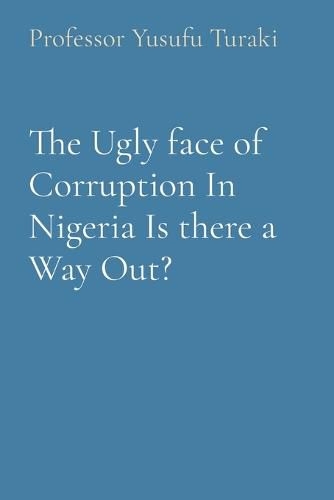Readings Newsletter
Become a Readings Member to make your shopping experience even easier.
Sign in or sign up for free!
You’re not far away from qualifying for FREE standard shipping within Australia
You’ve qualified for FREE standard shipping within Australia
The cart is loading…






This title is printed to order. This book may have been self-published. If so, we cannot guarantee the quality of the content. In the main most books will have gone through the editing process however some may not. We therefore suggest that you be aware of this before ordering this book. If in doubt check either the author or publisher’s details as we are unable to accept any returns unless they are faulty. Please contact us if you have any questions.
Corruption! Corruption!! Corruption!!! Wherever you turn people are talking about corruption. Corruption is prevalent in society. It is seen in the high corridors of power, among the movers and shakers of society, it is present in business; it is also present among the so-called "common" people.
What is corruption?
Corruption has been defined in many ways. A simple definition given in the Oxford dictionary is, "widespread moral deterioration." The classic definition, followed by the World Bank and Transparency International, views corruption as "the use of one's public position for illegitimate private gains." Information International based in Lebanon adopted the following definition: "Corruption is the behavior of private individuals or public officials who deviate from set responsibilities and use their position of power in order to serve private ends and secure private gains." (Lebanon Anti-Corruption Initiative Report 1999). The UN's Global Programme against Corruption defines corruption as the "abuse of power for private gain" and includes thereby both the public and private sector.
Yusufu Turaki is a Professor of Theology and Social Ethics. He teaches Theology and Social Ethics at the Jos ECWA Theological Seminary (JETS) since 1980. He studied Theology at Igbaja Theological Seminary, Nigeria (Th.B.); Theology and Ethics at Gordon-Conwell Theological Seminary, USA (MATS); and Social Ethics at Boston University, USA (Ph.D.). He was a Research Scholar with the Research Enablement Program sponsored by the PEW Charitable Trusts and administered by the Overseas Ministry Study Center, New Haven, Connecticut, USA and a Post-Doctoral Research Fellow at Yale Divinity School, Yale University, USA. He is currently the Regional Director of the International Bible Society Nigeria. He is married to Deborah and they have four children: Nyela, Yimi, Iyakachi and Ladi.
$9.00 standard shipping within Australia
FREE standard shipping within Australia for orders over $100.00
Express & International shipping calculated at checkout
This title is printed to order. This book may have been self-published. If so, we cannot guarantee the quality of the content. In the main most books will have gone through the editing process however some may not. We therefore suggest that you be aware of this before ordering this book. If in doubt check either the author or publisher’s details as we are unable to accept any returns unless they are faulty. Please contact us if you have any questions.
Corruption! Corruption!! Corruption!!! Wherever you turn people are talking about corruption. Corruption is prevalent in society. It is seen in the high corridors of power, among the movers and shakers of society, it is present in business; it is also present among the so-called "common" people.
What is corruption?
Corruption has been defined in many ways. A simple definition given in the Oxford dictionary is, "widespread moral deterioration." The classic definition, followed by the World Bank and Transparency International, views corruption as "the use of one's public position for illegitimate private gains." Information International based in Lebanon adopted the following definition: "Corruption is the behavior of private individuals or public officials who deviate from set responsibilities and use their position of power in order to serve private ends and secure private gains." (Lebanon Anti-Corruption Initiative Report 1999). The UN's Global Programme against Corruption defines corruption as the "abuse of power for private gain" and includes thereby both the public and private sector.
Yusufu Turaki is a Professor of Theology and Social Ethics. He teaches Theology and Social Ethics at the Jos ECWA Theological Seminary (JETS) since 1980. He studied Theology at Igbaja Theological Seminary, Nigeria (Th.B.); Theology and Ethics at Gordon-Conwell Theological Seminary, USA (MATS); and Social Ethics at Boston University, USA (Ph.D.). He was a Research Scholar with the Research Enablement Program sponsored by the PEW Charitable Trusts and administered by the Overseas Ministry Study Center, New Haven, Connecticut, USA and a Post-Doctoral Research Fellow at Yale Divinity School, Yale University, USA. He is currently the Regional Director of the International Bible Society Nigeria. He is married to Deborah and they have four children: Nyela, Yimi, Iyakachi and Ladi.